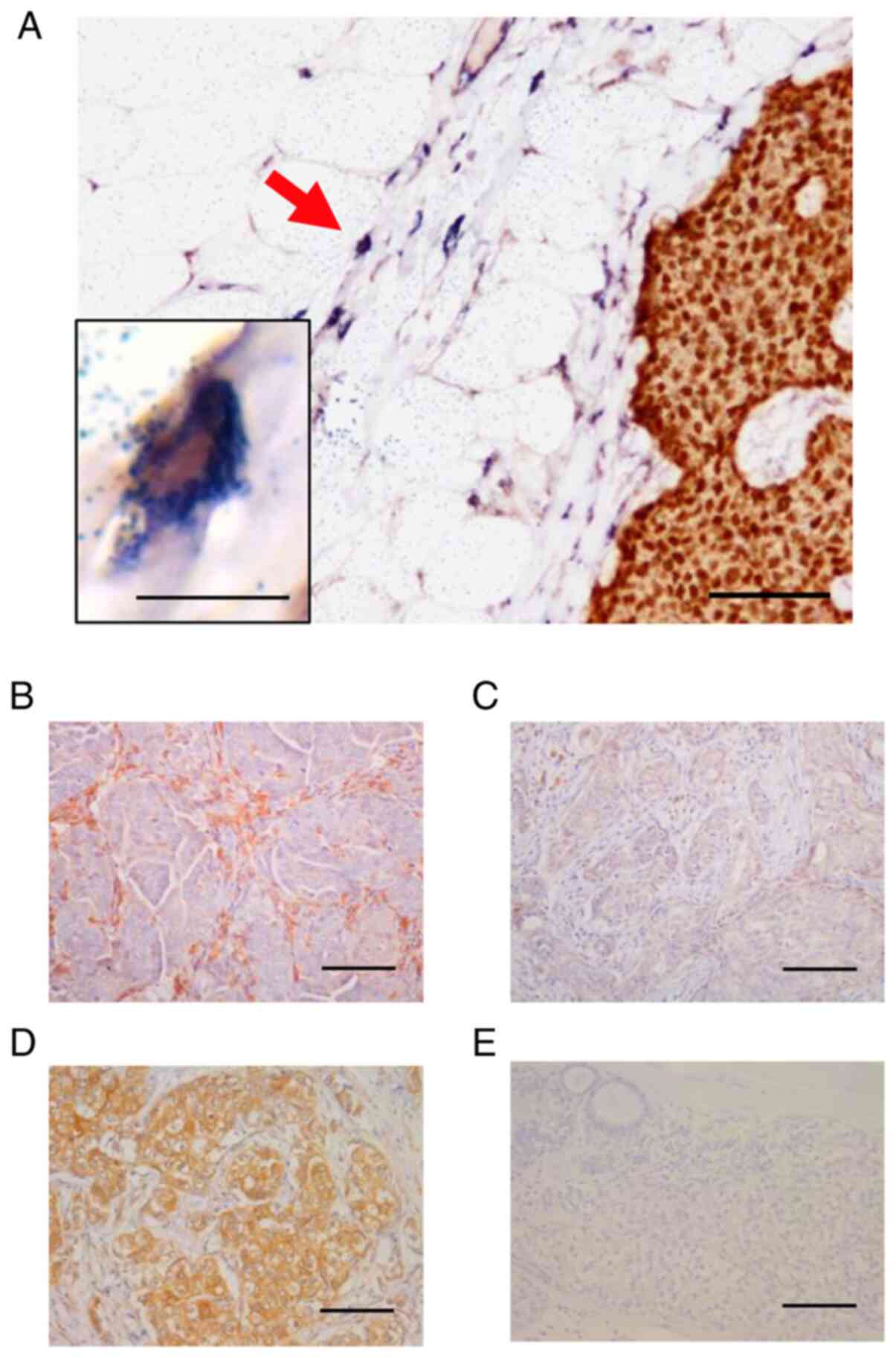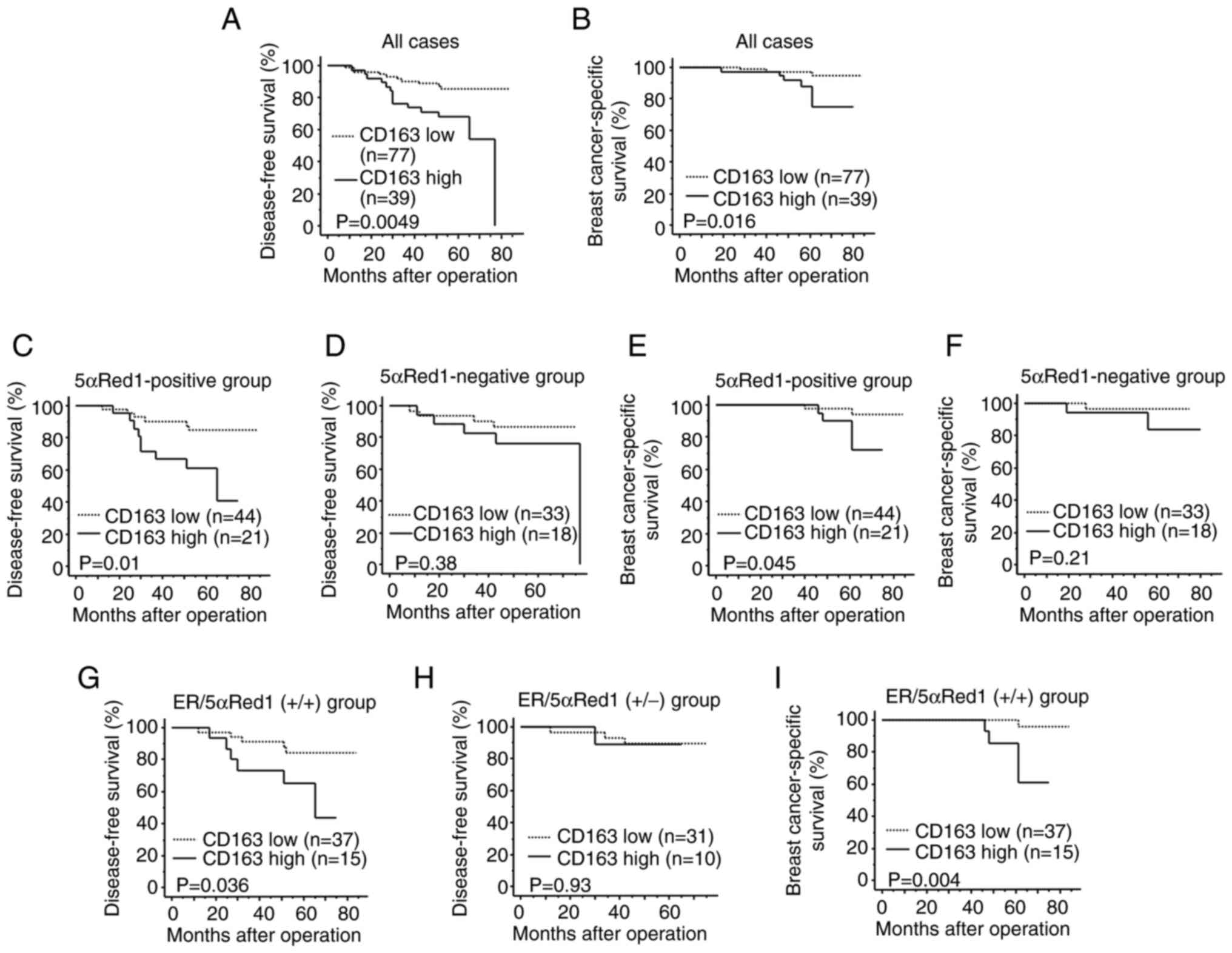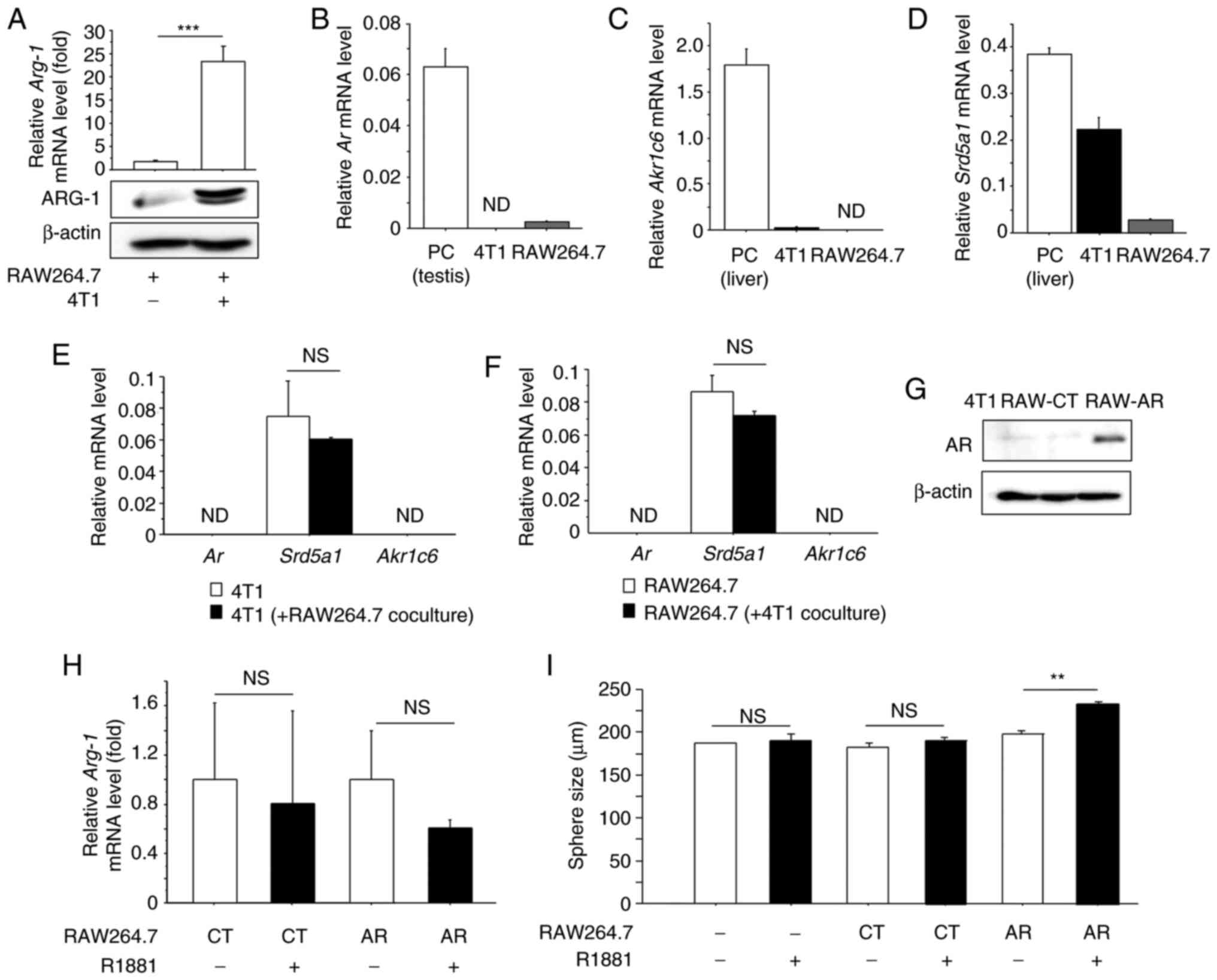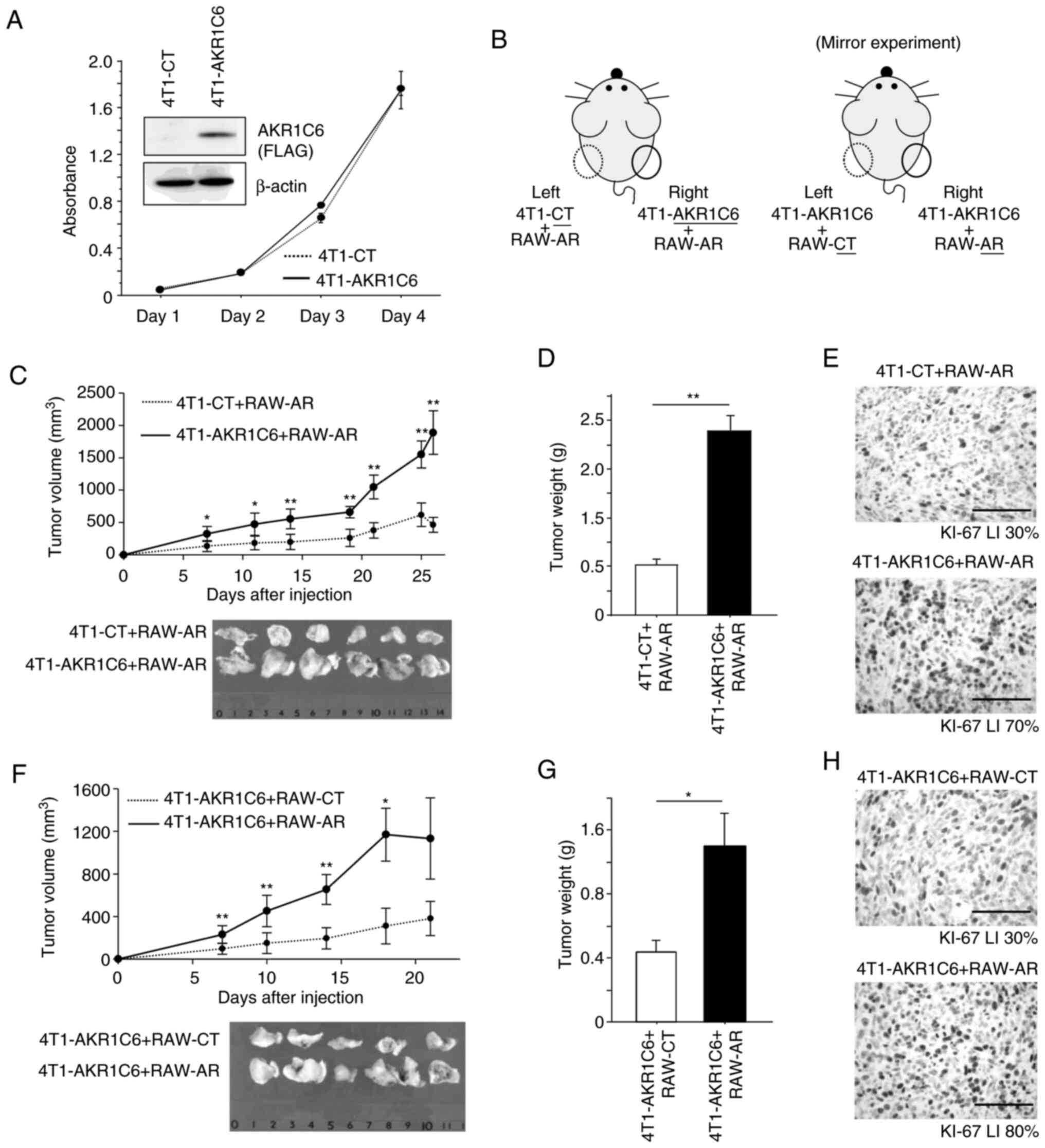|
1
|
Luqmani YA and Alam-Eldin N: Overcoming
resistance to endocrine therapy in breast cancer: New approaches to
a nagging problem. Med Princ Pract. 25 (Suppl 2):S28–S40. 2016.
View Article : Google Scholar
|
|
2
|
Suzuki T, Darnel AD, Akahira JI, Ariga N,
Ogawa S, Kaneko C, Takeyama J, Moriya T and Sasano H:
5alpha-reductases in human breast carcinoma: Possible modulator of
in situ androgenic actions. J Clin Endocrinol Metab. 86:2250–2257.
2001. View Article : Google Scholar : PubMed/NCBI
|
|
3
|
Suzuki T, Miki Y, Moriya T, Akahira J,
Ishida T, Hirakawa H, Yamaguchi Y, Hayashi S and Sasano H:
5Alpha-reductase type 1 and aromatase in breast carcinoma as
regulators of in situ androgen production. Int J Cancer.
120:285–291. 2007. View Article : Google Scholar : PubMed/NCBI
|
|
4
|
Hall RE, Aspinall JO, Horsfall DJ, Birrell
SN, Bentel JM, Sutherland RL and Tilley WD: Expression of the
androgen receptor and an androgen-responsive protein,
apolipoprotein D, in human breast cancer. Br J Cancer.
74:1175–1180. 1996. View Article : Google Scholar : PubMed/NCBI
|
|
5
|
Kuenen-Boumeester V, Van der Kwast TH,
Claassen CC, Look MP, Liem GS, Klijn JG and Henzen-Logmans SC: The
clinical significance of androgen receptors in breast cancer and
their relation to histological and cell biological parameters. Eur
J Cancer. 32A:1560–1565. 1996. View Article : Google Scholar : PubMed/NCBI
|
|
6
|
Vera-Badillo FE, Templeton AJ, de Gouveia
P, Diaz-Padilla I, Bedard PL, Al-Mubarak M, Seruga B, Tannock IF,
Ocana A and Amir E: Androgen receptor expression and outcomes in
early breast cancer: A systematic review and meta-analysis. J Natl
Cancer Inst. 106:djt3192014. View Article : Google Scholar : PubMed/NCBI
|
|
7
|
Farmer P, Bonnefoi H, Becette V,
Tubiana-Hulin M, Fumoleau P, Larsimont D, Macgrogan G, Bergh J,
Cameron D, Goldstein D, et al: Identification of molecular apocrine
breast tumours by microarray analysis. Oncogene. 24:4660–4671.
2005. View Article : Google Scholar : PubMed/NCBI
|
|
8
|
Lehmann BD, Bauer JA, Chen X, Sanders ME,
Chakravarthy AB, Shyr Y and Pietenpol JA: Identification of human
triple-negative breast cancer subtypes and preclinical models for
selection of targeted therapies. J Clin Invest. 121:2750–2767.
2011. View
Article : Google Scholar : PubMed/NCBI
|
|
9
|
Fujii R, Hanamura T, Suzuki T, Gohno T,
Shibahara Y, Niwa T, Yamaguchi Y, Ohnuki K, Kakugawa Y, Hirakawa H,
et al: Increased androgen receptor activity and cell proliferation
in aromatase inhibitor-resistant breast carcinoma. J Steroid
Biochem Mol Biol. 144:513–522. 2014. View Article : Google Scholar : PubMed/NCBI
|
|
10
|
De Palma M, Biziato D and Petrova TV:
Microenvironmental regulation of tumour angiogenesis. Nat Rev
Cancer. 17:457–474. 2017. View Article : Google Scholar : PubMed/NCBI
|
|
11
|
Vasiliadou I and Holen I: The role of
macrophages in bone metastasis. J Bone Oncol. 2:158–166. 2013.
View Article : Google Scholar : PubMed/NCBI
|
|
12
|
Gan L, Qiu Z, Huang J, Li Y, Huang H,
Xiang T, Wan J, Hui T, Lin Y, Li H and Ren G: Cyclooxygenase-2 in
tumor-associated macrophages promotes metastatic potential of
breast cancer cells through Akt pathway. Int J Biol Sci.
12:1533–1543. 2016. View Article : Google Scholar : PubMed/NCBI
|
|
13
|
Yang J, Li X, Liu X and Liu Y: The role of
tumor-associated macrophages in breast carcinoma invasion and
metastasis. Int J Clin Exp Pathol. 8:6656–6664. 2015.PubMed/NCBI
|
|
14
|
Li J, He K, Liu P and Xu LX: Iron
participated in breast cancer chemoresistance by reinforcing IL-6
paracrine loop. Biochem Biophys Res Commun. 475:154–160. 2016.
View Article : Google Scholar : PubMed/NCBI
|
|
15
|
Liu H, Wang J, Zhang M, Xuan Q, Wang Z,
Lian X and Zhang Q: Jagged1 promotes aromatase inhibitor resistance
by modulating tumor-associated macrophage differentiation in breast
cancer patients. Breast Cancer Res Treat. 166:95–107. 2017.
View Article : Google Scholar : PubMed/NCBI
|
|
16
|
Gelsomino L, Giordano C, Camera GL, Sisci
D, Marsico S, Campana A, Tarallo R, Rinaldi A, Fuqua S, Leggio A,
et al: Leptin signaling contributes to aromatase inhibitor
resistant breast cancer cell growth and activation of macrophages.
Biomolecules. 10:5432020. View Article : Google Scholar : PubMed/NCBI
|
|
17
|
Chanmee T, Ontong P, Konno K and Itano N:
Tumor-associated macrophages as major players in the tumor
microenvironment. Cancers (Basel). 6:1670–1690. 2014. View Article : Google Scholar : PubMed/NCBI
|
|
18
|
Murray PJ, Allen JE, Biswas SK, Fisher EA,
Gilroy DW, Goerdt S, Gordon S, Hamilton JA, Ivashkiv LB, Lawrence
T, et al: Macrophage activation and polarization: nomenclature and
experimental guidelines. Immunity. 41:14–20. 2014. View Article : Google Scholar : PubMed/NCBI
|
|
19
|
Sousa S, Brion R, Lintunen M, Kronqvist P,
Sandholm J, Mönkkönen J, Kellokumpu-Lehtinen PL, Lauttia S,
Tynninen O, Joensuu H, et al: Human breast cancer cells educate
macrophages toward the M2 activation status. Breast Cancer Res.
17:1012015. View Article : Google Scholar : PubMed/NCBI
|
|
20
|
McCrohon JA, Death AK, Nakhla S, Jessup W,
Handelsman DJ, Stanley KK and Celermajer DS: Androgen receptor
expression is greater in macrophages from male than from female
donors. A sex difference with implications for atherogenesis.
Circulation. 101:224–226. 2000. View Article : Google Scholar : PubMed/NCBI
|
|
21
|
Huang CK, Pang H, Wang L, Niu Y, Luo J,
Chang E, Sparks JD, Lee SO and Chang C: New therapy via targeting
androgen receptor in monocytes/macrophages to battle
atherosclerosis. Hypertension. 63:1345–1353. 2014. View Article : Google Scholar : PubMed/NCBI
|
|
22
|
Lai JJ, Lai KP, Chuang KH, Chang P, Yu IC,
Lin WJ and Chang C: Monocyte/macrophage androgen receptor
suppresses cutaneous wound healing in mice by enhancing local
TNF-alpha expression. J Clin Invest. 119:3739–3751. 2009.
View Article : Google Scholar : PubMed/NCBI
|
|
23
|
Yamaguchi M, Takagi K, Sato A, Miki Y,
Miyashita M, Sasano H and Suzuki T: Rac1 activation in human breast
carcinoma as a prognostic factor associated with therapeutic
resistance. Breast Cancer. 27:919–928. 2020. View Article : Google Scholar : PubMed/NCBI
|
|
24
|
Yamaguchi M, Takagi K, Narita K, Miki Y,
Onodera Y, Miyashita M, Sasano H and Suzuki T: Stromal CCL5
promotes breast cancer progression by interacting with ccr3 in
tumor cells. Int J Mol Sci. 22:19182021. View Article : Google Scholar : PubMed/NCBI
|
|
25
|
Hamlin IM: Possible host resistance in
carcinoma of the breast: A histological study. Br J Cancer.
22:383–401. 1968. View Article : Google Scholar : PubMed/NCBI
|
|
26
|
Hammond ME, Hayes DF, Wolff AC, Mangu PB
and Temin S: American society of clinical oncology/college of
american pathologists guideline recommendations for
immunohistochemical testing of estrogen and progesterone receptors
in breast cancer. J Oncol Pract. 6:195–197. 2010. View Article : Google Scholar : PubMed/NCBI
|
|
27
|
Takagi K, Miki Y, Onodera Y, Ishida T,
Watanabe M, Sasano H and Suzuki T: ARHGAP15 in human breast
carcinoma: A potent tumor suppressor regulated by androgens. Int J
Mol Sci. 19:E8042018. View Article : Google Scholar
|
|
28
|
Sato A, Takagi K, Miki Y, Yoshimura A,
Hara M, Ishida T, Sasano H and Suzuki T: Cytochrome c1 as a
favorable prognostic marker in estrogen receptor-positive breast
carcinoma. Histol Histopathol. 34:1365–1375. 2019.PubMed/NCBI
|
|
29
|
Vergnes L, Phan J, Stolz A and Reue K: A
cluster of eight hydroxysteroid dehydrogenase genes belonging to
the aldo-keto reductase supergene family on mouse chromosome 13. J
Lipid Res. 44:503–511. 2003. View Article : Google Scholar : PubMed/NCBI
|
|
30
|
Niu Y, Altuwaijri S, Yeh S, Lai KP, Yu S,
Chuang KH, Huang SP, Lardy H and Chang C: Targeting the stromal
androgen receptor in primary prostate tumors at earlier stages.
Proc Natl Acad Sci USA. 105:12188–12193. 2008. View Article : Google Scholar : PubMed/NCBI
|
|
31
|
Cioni B, Zaalberg A, van Beijnum JR, Melis
MHM, van Burgsteden J, Muraro MJ, Hooijberg E, Peters D, Hofland I,
Lubeck Y, et al: Androgen receptor signalling in macrophages
promotes TREM-1-mediated prostate cancer cell line migration and
invasion. Nat Commun. 11:44982020. View Article : Google Scholar : PubMed/NCBI
|
|
32
|
Figueroa F, Davicino R, Micalizzi B,
Oliveros L and Forneris M: Macrophage secretions modulate the
steroidogenesis of polycystic ovary in rats: Effect of testosterone
on macrophage pro-inflammatory cytokines. Life Sci. 90:733–739.
2012. View Article : Google Scholar : PubMed/NCBI
|
|
33
|
Levano KS, Jung EH and Kenny PA: Breast
cancer subtypes express distinct receptor repertoires for
tumor-associated macrophage derived cytokines. Biochem Biophys Res
Commun. 411:107–110. 2011. View Article : Google Scholar : PubMed/NCBI
|
|
34
|
Chen LY, Brown PR, Willis WB and Eddy EM:
Peritubular myoid cells participate in male mouse spermatogonial
stem cell maintenance. Endocrinology. 155:4964–4974. 2014.
View Article : Google Scholar : PubMed/NCBI
|
|
35
|
Gwak JM, Jang MH, Kim DI, Seo AN and Park
SY: Prognostic value of tumor-associated macrophages according to
histologic locations and hormone receptor status in breast cancer.
PLoS One. 10:e01257282015. View Article : Google Scholar : PubMed/NCBI
|
|
36
|
Klingen TA, Chen Y, Aas H, Wik E and
Akslen LA: Tumor-associated macrophages are strongly related to
vascular invasion, non-luminal subtypes, and interval breast
cancer. Hum Pathol. 69:72–80. 2017. View Article : Google Scholar : PubMed/NCBI
|
|
37
|
Takagi K, Miki Y, Nagasaki S, Hirakawa H,
Onodera Y, Akahira J, Ishida T, Watanabe M, Kimijima I, Hayashi S,
et al: Increased intratumoral androgens in human breast carcinoma
following aromatase inhibitor exemestane treatment. Endocr Relat
Cancer. 17:415–430. 2010. View Article : Google Scholar : PubMed/NCBI
|
|
38
|
Yang L and Zhang Y; Tumor-associated
macrophages, : From basic research to clinical application. J
Hematol Oncol. 10:582017. View Article : Google Scholar : PubMed/NCBI
|
|
39
|
Schneider CP, Schwacha MG, Samy TS, Bland
KI and Chaudry IH: Androgen-mediated modulation of macrophage
function after trauma-hemorrhage: Central role of
5alpha-dihydrotestosterone. J Appl Physiol (1985). 95:104–112.
2003. View Article : Google Scholar : PubMed/NCBI
|
|
40
|
Zhao R, Wang X, Jiang C, Shi F, Zhu Y,
Yang B, Zhuo J, Jing Y, Luo G, Xia S and Han B: Finasteride
accelerates prostate wound healing after thulium laser resection
through DHT and AR signalling. Cell Prolif. 51:e124152018.
View Article : Google Scholar : PubMed/NCBI
|
|
41
|
Hagemann T, Robinson SC, Schulz M, Trümper
L, Balkwill FR and Binder C: Enhanced invasiveness of breast cancer
cell lines upon co-cultivation with macrophages is due to TNF-alpha
dependent up-regulation of matrix metalloproteases. Carcinogenesis.
25:1543–1549. 2004. View Article : Google Scholar : PubMed/NCBI
|
|
42
|
Wan S, Zhao E, Kryczek I, Vatan L,
Sadovskaya A, Ludema G, Simeone DM, Zou W and Welling TH:
Tumor-associated macrophages produce interleukin 6 and signal via
STAT3 to promote expansion of human hepatocellular carcinoma stem
cells. Gastroenterology. 147:1393–1404. 2014. View Article : Google Scholar : PubMed/NCBI
|
|
43
|
Mohibi S, Mirza S, Band H and Band V:
Mouse models of estrogen receptor-positive breast cancer. J
Carcinog. 10:352011. View Article : Google Scholar : PubMed/NCBI
|
|
44
|
Pulaski BA and Ostrand-Rosenberg S: Mouse
4T1 breast tumor model. Curr Protoc Immunol. 20:Chapter 20: Unit
20.2. 2001.PubMed/NCBI
|
|
45
|
Cho HJ, Jung JI, Lim DY, Kwon GT, Her S
and Park JH and Park JH: Bone marrow-derived, alternatively
activated macrophages enhance solid tumor growth and lung
metastasis of mammary carcinoma cells in a Balb/C mouse orthotopic
model. Breast Cancer Res. 14:R812012. View Article : Google Scholar : PubMed/NCBI
|
|
46
|
Jang JY, Lee JK, Jeon YK and Kim CW:
Exosome derived from epigallocatechin gallate treated breast cancer
cells suppresses tumor growth by inhibiting tumor-associated
macrophage infiltration and M2 polarization. BMC Cancer.
13:4212013. View Article : Google Scholar : PubMed/NCBI
|


















